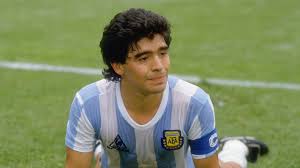Few athletes in history have embodied both the genius and chaos of sport like Diego Armando Maradona. Revered in Argentina and worshipped in Naples, Maradona wasn’t just a footballer he was a cultural force, a flawed icon, and an artist with a ball at his feet. Though his career was as turbulent as it was transcendent, his influence on the game is eternal.
Born to Defy Gravity
Maradona’s rise from the impoverished outskirts of Villa Fiorito, Buenos Aires, to global superstardom is the stuff of legend. By age 15, he was already turning heads for Argentinos Juniors. At 16, he debuted for Argentina’s national team. At 25, he was immortal.
Unlike many football prodigies who emerged from elite academies, Maradona’s early years taught him to play with grit, flair, and rebellion characteristics that would define his style. Small in stature (5’5”), but enormous in personality, he played as if the laws of physics bent to his will.
The Game-Changer at Mexico ’86
Maradona’s greatest moment and perhaps the greatest individual performance in World Cup history came at Mexico 1986. As captain, he dragged an average Argentina team to victory almost single-handedly.
In the quarterfinal against England, he scored two goals that encapsulate the paradox of his legacy. First, the infamous “Hand of God”, where he punched the ball into the net, unseen by referees. Moments later, the “Goal of the Century”, when he weaved past five English defenders in a run that seemed impossible part ballet, part street fight.
These two goals, scored within four minutes, remain the most iconic in World Cup history and perhaps the clearest metaphor for Maradona himself: the sinner and the saint, the magician and the outlaw.
Napoli: A Love Affair Like No Other
Maradona didn’t just win matches he changed cities. When he joined Napoli in 1984, the club had never won a league title and was seen as an underdog in the elite northern-dominated Serie A.
Under Maradona’s leadership, Napoli won two Scudetti (1987, 1990), a Coppa Italia, and a UEFA Cup. But beyond the silverware, he gave Naples something deeper: pride, defiance, and identity. He became a symbol of southern Italy’s resistance against northern elitism. For many, he was more than a player he was a revolutionary in shorts.
His impact on Napoli was so profound that after his death in 2020, the club renamed their stadium Stadio Diego Armando Maradona a rare honor for a foreign-born player.
The Sport’s Most Human God
Maradona’s career was also marked by excess. His battles with addiction, his volatile temperament, and off-field controversies often overshadowed his brilliance. But these flaws never diminished his genius they made it more relatable.
Unlike other pristine icons, Maradona never pretended to be perfect. He was a god who lived like a man vulnerable, erratic, passionate, and fiercely loyal. In doing so, he became a mirror for the people he inspired: working-class fans who saw in him their own struggles, dreams, and defiance.
A Legacy That Lives On
Maradona didn’t just play the game he transformed it. He made football political, personal, and poetic. He inspired players like Lionel Messi and Ronaldinho, who borrowed his low center of gravity, dribbling wizardry, and joy of expression.
FIFA’s decision to split the “Greatest Player of the 20th Century” award between Maradona and Pelé speaks volumes: Pelé represented the perfect product of a golden era, while Maradona represented football’s raw soul unpredictable, emotional, and unforgettable.
Even after retirement, and through a rollercoaster post-playing life that included coaching stints and dramatic media moments, Maradona remained a central figure in global football culture.
The Genius Who Broke Every Rule and Rewrote the Game
Diego Maradona was not just a football icon he was a myth in motion, a contradiction who inspired millions with both his brilliance and his humanity. He showed that sport is not just about winning, but about expression, defiance, and identity.
In a world that often values perfection, Maradona’s story endures because it was imperfectly divine. He broke the rules, danced with danger, and made football beautiful in a way few ever could.
Maradona didn’t just play the game he changed it, forever.

